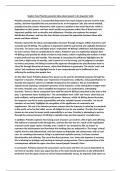Explore how Priestley presents ideas about power in An Inspector Calls
Priestley presents power as a concept that determines how much respect a person receives from
society, and how reputable they are perceived to be. In An Inspector Calls, the narrow-minded,
prejudiced society concern themselves with a person’s position in the social hierarchy, which is
dependent on their power, and how much wealth one possesses rather than if they have truly
important qualities such as morality and selflessness. Priestley also explores the unequal
distribution of power, and how the class division increases the separation between those with
power and those without.
Priestley represents the abuse and exploitation of power through arrogant, selfish characters such
as Gerald and Mr Birling. The audience is exposed to both the patriarchal and capitalist dominance
of society. ‘for lower costs and higher prices’ emphasises Mr Birling’s selfishness and desperation
for more money, with no consideration for others. Priestley’s use of a euphemism displays how
Mr Birling could possibly be afraid of what he truly means, which is exploiting the workers in order
to gain profit and reap the benefits. This attempt at concealing his selfishness highlights how he
may have a slight sense of morality, and is aware he is in the wrong, yet his judgment is clouded
by money and power. Mr Birling’s business-like approach throughout the play illustrates how he
views life through the prism of money, rather than kindness or generosity. The words ‘costs’ and
‘prices’ lack sentiment and highlight how he is not compassionate and is indifferent to the
suffering the working-class people face.
On the other hand, Priestley displays how power can be used for beneficial purposes through the
Inspector’s character. Priestley uses ‘impression of massiveness, solidarity, and purposefulness’ to
describe the Inspector when he is initially introduced to the audience. We are immediately
exposed to the imposing, omnipotent presence of the Inspector, as the atmosphere changes when
he enters. Priestley uses a list to establish the Inspector as an authoritative, intimidating
character. There is a direct comparison here with the way Mr Birling is described at the start of the
play; ‘a portentous heavy-looking man’. The connotations from ‘solid’ and ‘heavy’ show they are
both confident, well-grounded figures with power. However, whilst Mr Birling abuses his power,
the Inspector uses his to teach responsibility and other valuable lessons of morality. ‘we are all
members of one body’ highlights his recognition of the significance of community and
togetherness. The use of an inclusive pronoun conveys how the Inspector is referring to everybody
in the world, as he has the belief, we are all obliged to care for one another. The idea that upper
classes are too proud to accept social responsibility is an issue. Priestley is attempting to portray
through the contrast between Mr Birling’s capitalist views and the Inspector’s socialist ones.
In addition, Priestley explores how having a lack of power can result in a life of pain and suffering.
The audience is exposed to this through Eva, and how her fate was of a result of the exploitation
of power by the upper classes. Priestley uses a simile in ‘you treated her like an animal’ to
represent the mistreatment and harshness the working class are subjected to. The image ‘animal’
implies that Eva felt dehumanised, and was treated as disposable and unimportant, with no real
care. As a working-class woman, living in a patriarchal capitalist society, Eva faces constant
discrimination and suffering. The use of the direct pronoun ‘you’ shows the Inspector is accusing
Eric of abusing his privilege and harming an innocent young woman. This is representative of the
contemptuous attitude the upper class have toward people ‘beneath’ them.
In conclusion, Priestley exposes the ways power can be used, and how we use it is dependent on
our level of morality. Some may argue that Eva is the most morally powerful, as she withstood ill
treatment from the upper classes as well as being emotionally strong. An Inspector Calls shows us




